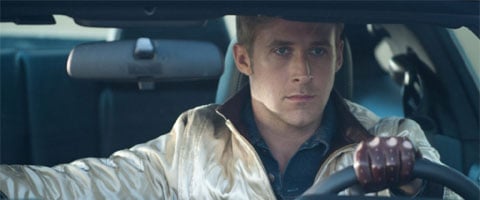LAFF '11: Drive Review

Your Daily Blend of Entertainment News
You are now subscribed
Your newsletter sign-up was successful
I’ve never heard a film quite like Drive before. It’s a strange thing to say when talking about a movie, a medium largely recognized for its visual qualities, but it needs to be said. Every little rev of an engine and bullet fired is perfectly measured in both design and volume, building relentless tension with silence and then going nuclear with blasts of sound, making ears bleed and wedging audience members into that tight space between the cushion and the back of seat. The most incredible thing, though? Between the gripping performances, the stunning lighting, the perfect soundtrack and the taut script, the sound is only the tip of the iceberg when it comes to the brilliance that is director Nicolas Winding Refn’s newest film.
When we first meet Driver (Ryan Gosling), a character never given a real name, he is in his apartment on the phone arranging a deal with the man on the other line to act as a wheelman for a robbery. But that’s only his night job. By day he works in an auto garage and as a stuntman, both jobs done with his friend Shannon (Bryan Cranston) at his side. Driver then meets and gets to know his next door neighbor, Irene (Carey Mulligan), and her young son (Kaden Leos), and everything seems to be going perfectly. Then Irene’s boyfriend, Standard (Oscar Isaac), is released from prison and while Driver is hesitant at first, he eventually agrees to help Standard hold up a pawn shop to settle debts from when he was incarcerated. When the job goes wrong, however, Driver finds himself not only needing to protect himself, but everyone he cares about.
The true brilliance behind Drive rests in the Winding Refn’s direction, which is as immaculate as filmmaking gets. There isn’t a single shadow or light source placed without extreme care and there isn’t a single angle or frame that doesn’t scream of heavy consideration (what he does with reflective surfaces is practically poetic). What’s most impressive about the director’s style, however, is that he isn’t afraid of the films harsher content. Just as he did in previous efforts such as Bronson and Valhalla Rising, Winding Refn shows the extreme consequences of his characters’ actions and the results are will straighten the spine of every movie-goer. Most importantly, the visceral style never feels gratuitous or like it’s glorifying the actions of the characters. The entire film is grounded in reality which only makes every punch hit harder. Once this film hits theaters Nicolas Winding Refn is guaranteed to become an instant star.
Deserving its own place in the sun is the film’s soundtrack. Matching the pink, 80s-esque title font, the track listing largely consists of energetic synth-pop from bands like College, Kavinsky and Desire. While one would think that the tones would clash horribly, the contrast always works in the film’s favor and the songs are strategically placed as not to interfere with the more intense moments and break the tension. For these moments attention must be turned towards composer Cliff Martinez, who bridges the gaps between songs and keeps the music consistent by using a synthesizer of his own, but also provides a great deal of subtlety and lets the action in each scene speak for itself.
It’s impossible not to talk about Drive and not mention the brilliant performances from each member of the cast. At the center of it all is Gosling, who balances a role that is both understated and intense. A soft spoken character who rarely delivers more than one line of dialogue at a time, much of Gosling’s performance comes from his eyes and simple expressions with which he sells the entire character. But while Driver may have the most screen time, Gosling is hardly the picture’s only star. Albert Brooks, who plays a hardened Jewish mobster named Bernie Rose, is one of the movie’s greatest surprises, as the character is completely against the actor’s type, but he truly embodies the character. Only making the performance more powerful is that the script by Hossein Amini allows Rose to actually be funny at times, letting the audience express their natural reaction to seeing Brooks on screen, but when Rose gets down to business Brooks becomes a performer that we’ve never quite seen before. Not a single role in the film is miscast and everyone puts on their A-game.
While the film isn’t set to come out until September, I will close out this review by saying this: see Drive in big screens as many times as you can and only in the best theaters you can find. While every element of the movie stands up, it’s a film that demands to be on a big screen with the greatest speakers imaginable. As for me, I plan on asking for vacation days the week after the film is released and buying a whole new stereo system when it comes out on home video. It’s worth every penny.
Your Daily Blend of Entertainment News

Eric Eisenberg is the Assistant Managing Editor at CinemaBlend. After graduating Boston University and earning a bachelor’s degree in journalism, he took a part-time job as a staff writer for CinemaBlend, and after six months was offered the opportunity to move to Los Angeles and take on a newly created West Coast Editor position. Over a decade later, he's continuing to advance his interests and expertise. In addition to conducting filmmaker interviews and contributing to the news and feature content of the site, Eric also oversees the Movie Reviews section, writes the the weekend box office report (published Sundays), and is the site's resident Stephen King expert. He has two King-related columns.
